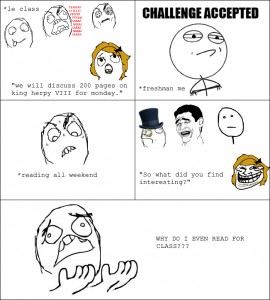Students of the liberal arts persuasion will often find the temptation to slack off on reading assignments rather hard to resist. If you attend Gustavus, you have probably heard something along these lines:
“All we do in (insert preferred humanities class) is sit around and discuss (insert favorite abstract concept). I’ll just read the intro and conclusion and be fine.”
 There are varying degrees of this. I would say that most make an honest effort to keep up with class reading, perhaps not always succeeding, but are generally responsible about being prepared for class. Some read every word of every book they are ever assigned and highlight religiously. Others read until they know the professor’s expectations and use that to gauge their effort level for the rest of the semester. And a few prefer to live dangerously, coming unprepared most of the time and B.S. their way through discussion.
There are varying degrees of this. I would say that most make an honest effort to keep up with class reading, perhaps not always succeeding, but are generally responsible about being prepared for class. Some read every word of every book they are ever assigned and highlight religiously. Others read until they know the professor’s expectations and use that to gauge their effort level for the rest of the semester. And a few prefer to live dangerously, coming unprepared most of the time and B.S. their way through discussion.
It matters little where you generally fall on this spectrum; we have all had that experience where you came to class having not done everything you were supposed to and it didn’t matter. Those instances can make us feel invincible and inclined to try it again.
As much as I would like to say we should resist this urge whenever possible, there is a silver lining to the slacker mentality that I’m sure many a hardworking student has found annoying at some point in their academic career. Perhaps some degree of not being prepared for class can actually make you smarter and help develop real skills that will be useful later on.
Rather than reading every page meticulously trying to absorb details that might be on the next test, skimming chapters for key words and concepts can help you make connections more quickly and make you a more efficient studier. Learning to focus only on the essential concepts, and, more importantly, being able to pick them out in a text is a critical thinking skill that effective slackers have to get very good at.
Learning how to talk about something you don’t entirely understand while sounding like you understand is also a useful skill. It may sound cynical, but it is one of the keystones of being an effective writer. Even dedicated students run into essay questions that stump them occasionally, and when the purpose of essay questions is to demonstrate how much you know, it couldn’t hurt to have experience in sounding smarter than you are.
Obviously, these skills are not exclusively learned through slacking. This is not an endorsement of blowing off schoolwork. I don’t need to tell anybody how much students pay for their education here and every student should strive to make every class count. Take it more as advice: don’t agonize over huge piles of reading. If you are overwhelmed, take a leaf out of the slacker’s book and start skimming. Find what’s important, think about how to articulate it intelligently and skip the rest. You’ll be less stressed, more informed and a better critical thinker.